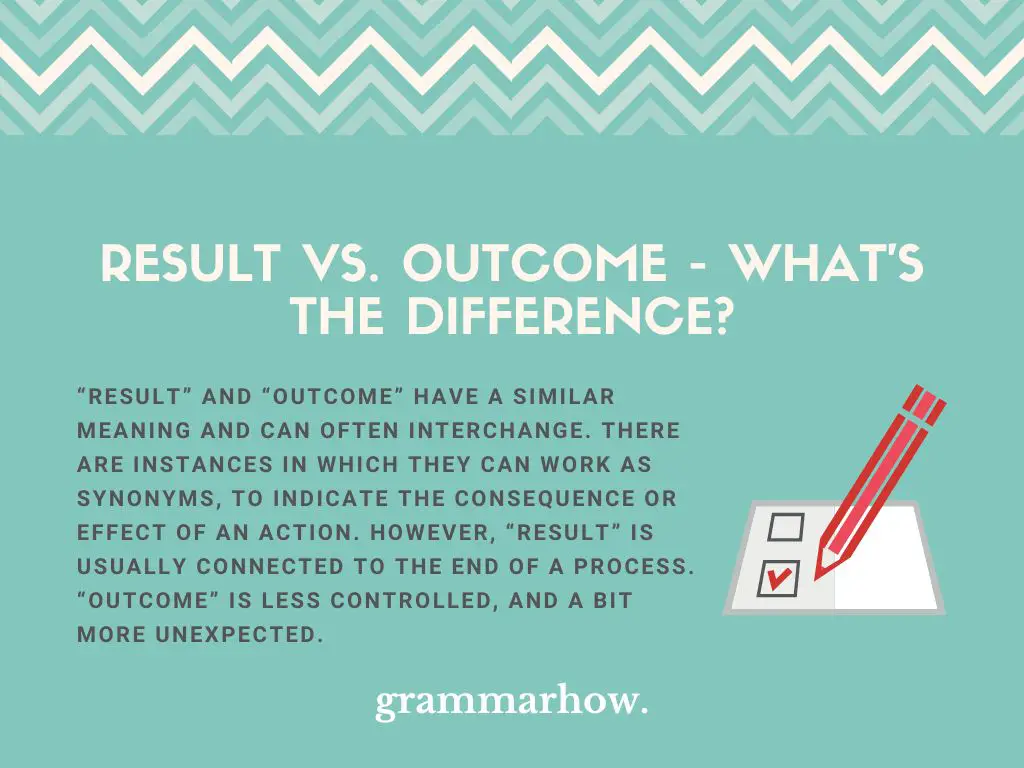“Result” and “Outcome” are often dealt with as synonyms. As if they could be used to convey the same meaning all the time. But are they, truly?
We want to take the time to look into each of those words and find out their meaning and most appropriate usage.
Result vs. Outcome – What’s the Difference?
“Result” and “Outcome” have a similar meaning and can often interchange. There are instances in which they can work as synonyms, to indicate the consequence or effect of an action. However, “Result” is usually connected to the end of a process. “Outcome” is less controlled, and a bit more unexpected.

Take a look at the examples below:
- The match result was a 1-0 win for the home team.
- The match outcome was a 1-0 win for the home team.
- What was the result of your conversation with her?
- What was the outcome of your conversation with her?
As you can see by the examples, interchanging “Result” with “Outcome” doesn’t necessarily affect the meaning of the sentence. But some things should be taken into consideration.
First, look at the set of sentences that talk about a match. Both words work fine and could be used with no harm to the message that’s conveyed.
Now, look at the second set. When talking about a conversation, replacing “Result” with “Outcome” affects the tone of the message that’s being sent. When you ask the “Result”, it indicates that the conversation was intentional, as if there was something that needed to be resolved.
When you ask about the “Outcome”, it sounds random. As if the person went into the conversation with no agenda, just to chat and see where it would lead.
Result
“Result” is something that happens or exists because of something else. It means that if you follow a process a certain “Result” (good or bad) is expected to take place. That’s why we say that people produce “Results” (and not “Outcomes”).
The Cambridge Dictionary agrees with the definition above, and expands it by explaining that “Result” is “to happen or exist because something else has happened”.
Let’s go over some examples of the word “Result” in use:
- This is only the result of Georgina’s carelessness.
- We tried to replace the tile in the bathroom – with disastrous results.
- To ensure you get the best possible results, use only fresh ingredients.
- Anthony’s disease was the result of a lifelong smoking habit.
- Trina knows how to get good results, so we should trust her.
Outcome
“Outcome” is the effect of an action or situation. It’s similar to a “Result” but isn’t necessarily the end of an orderly process. An “Outcome” may happen without any involved party having any control over it, giving a feeling that it could be random or not what was initially expected.
The Cambridge Dictionary expands this idea by sharing what an outcome is from a mathematical point of view: “an outcome is one of the possible results in a probability”.
Let’ see some good examples:
- The outcome wasn’t what the team expected.
- It’s far too early to predict the outcome of this experiment.
- The outcome of the study was not looking bright.
- The outcome of the match was a loss and we didn’t expect that.
- The project’s outcome was far better than anyone anticipated.
Which Is Used the Most?
Which word is used more often, “Result” or “Outcome”? Let’s find out by taking a look at the graph from Google Ngram Viewer below.

“Result” is the word that pops up more often, indicating that this is the preferred word in this comparison. However, we can’t help but notice that “Outcome” has been trending up for many years now, since around 1970, becoming more used as the years go by.
Result or Outcome in Research?
You can use both “Result” and “Outcome” when talking about research. However, keep in mind that “Outcome” carries a level of uncertainty. Since this is what we often see in research (where scientists don’t know for sure what they’ll find), “Outcome” is the more appropriate word to use.
That’s not to say you shouldn’t use the word “Result” in scientific environments. It’s more a reminder of what those words convey, so you can choose wisely.
Take a look at some examples:
- The outcome of the research was just as expected.
- We’re about to publish the results of a research that had quite an expected outcome.
- Dr. Phillips’ team followed the processes required for the research, but the results weren’t the expected.
Final Thoughts
“Result” and “Outcome” have similar meanings but aren’t exact synonyms. Both indicate the consequence of an action, and sometimes they can interchange. However, “Result” is usually related to a controlled process or steps to be taken, while “Outcome” always carries a level of uncertainty, as if anything could happen.

Martin holds a Master’s degree in Finance and International Business. He has six years of experience in professional communication with clients, executives, and colleagues. Furthermore, he has teaching experience from Aarhus University. Martin has been featured as an expert in communication and teaching on Forbes and Shopify. Read more about Martin here.
